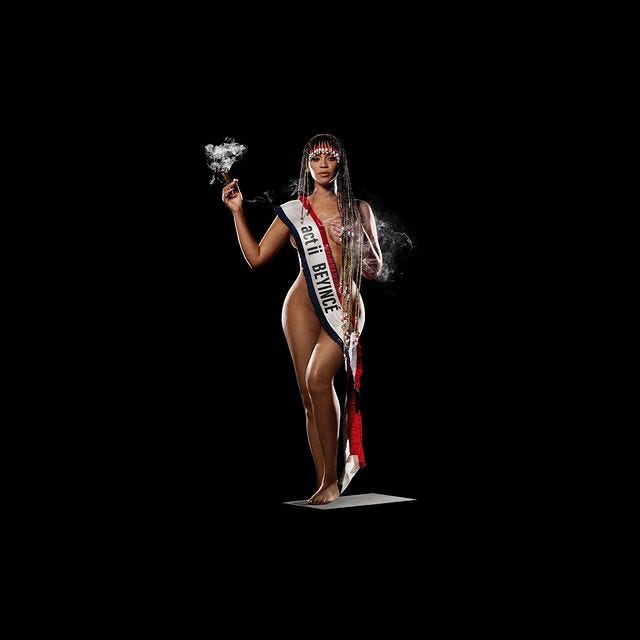The Toronto Star: Hallowed be Her Name
Why Beyoncé's accent aigu is an expression of survivance and joy
A version of this piece appeared in The Toronto Star
Beyoncé is la reine. The Queen. She is American. Southern. And Black.
"My Daddy Alabama, Momma Louisiana," she sings in Formation on her 2016 album Lemonade. "You mix that Negro with that Creole make a Texas bama."
And, like Céline Dion, Angélique Kidjo, Joséphine Baker, Timothée Chalamet, this Queen also has an accent aigu, a beautiful upward, exploding inflection of joy.
Hallowed be her name: Beyoncé’s accent aigu matters. It is sacred – or, cécred, if you will.
But when the chanteuse released her new album last month, Cowboy Carter, the media showed its ambivalence towards this quirk of language. Some, like CNN and The Toronto Star, included it; others, like CBC and The Globe and Mail, applied it inconsistently.
Cultures that embrace accents are too often stripped of this expression of voice and language, adapting to an anglophone and anglicizing zeitgeist that fails to recognize these halos as a marker of culture, identity, belonging — and survivance.
Like many in the francophone diaspora around the globe, Beyoncé’s genealogy is complex, knotted in histories of conquest and violence, exile and enslavement—all of which must spark urgent conversations on race, identity, and belonging in the present day—whether in America, Canada or French-speaking communities across l’Amérique française. Nevertheless, Beyoncé is a cousine créole. A franco-cousin. De la fesse gauche (loosely translated — ‘a cousin of the left buttock cheek,’ signifying that we’re kin even if we’re not necessarily related).
Her Acadian ancestors, like mine, were ripped from the only homes they had known during le Grand dérangement – or the Great Upheaval in the mid-1700s – and violently exiled by the British, scattered across the globe. Some were killed in shipwrecks, others died of disease and famine. Some resisted, hidden by the Mi'kmaq people. Some eventually fled to present-day Louisiana where they became America’s Cajun and Creole peoples.
As a member of the Beyhive since her days of No, No, No with Destiny's Child, I have been consumed by her works, including Cowboy Carter, a treatise on Black identity, voice, cultural creation stories — and who gets to claim these in America.
“This album (...) was born out of an experience that I had years ago where I did not feel welcomed,” Beyoncé wrote last month. She was perhaps alluding to her 2016 performance alongside The Chicks at the Country Music Awards, her “country music villain origin story,” which received racist and political backlash.
And yet, the album “was not revenge,” as cultural critic Kathleen Newman-Bremang wrote for Refinery 29, “but a reeducation” of “the Black contribution to a genre that has been co-opted, whitewashed, and gatekept.”
Oui.
Likewise, consider the origin story of Beyoncé’s Creole name.
“An odd name, a weird name,” once said Beyoncé’s mother, la Reine-Mère Tina Knowles, whose family name – usually spelled BEYINCÉ – was incorrectly etched on her birth certificate.
"Why didn't you argue and make them correct it?" Tina Knowles once asked her mother. “She said she did the first time and was told, "Be happy that you're getting a birth certificate because at one time Black people didn't get birth certificates... because it meant that you really didn't exist and you weren't important."
And, she adds, "They were like, "How dare you have a French name? We're going to screw this up real good for you."
Beyincé became Beyoncé. But the accent aigu survived.
“I feel like Cowboy Carter is a homage to the BEYINCÉ family tree,” posited one writer via X, an "homage to her mother lineage,” pointing to the photograph of Beyoncé — hair braided and beaded, a cigar in hand wearing a sash with her ancestral appellation, BEYINCÉ, scrawled across her heart — in the lead-up to the album’s release.
Ouiii.
Ultimately, the accent aigu in Beyoncé's name is more than just a beautiful Creole hieroglyph — it carries the echoes of ancestors, reverberating the tongues they once spoke.
It is a symbol of resistance. Of survivance.
And joy.
Read more about Beyoncé and Cowboy Carter:
On Cowboy Carter
Refinery 29 (Kathleen Newman-Bremang) | Cowboy Carter Isn't Revenge. It's A Reeducation.
Teen Vogue | Beyonce's New Album Cowboy Carter and the History of Black Country Music







Love this Isabelle! And chuckling at "cousine d'la fesse gauche" -- which a former nun taught me when we were trying to figure out what number cousins we are. This SO resonates -- I sometimes wonder at the intersection of the experience of descendants of women of the Acadian diaspora and of enslaved African women.
How do you get the accent into Substack? My work around is to write a name in OpenText, then cut and paste it into Substack.
Someday, perhaps we can figure out where our ancestors intersect.
Cousine de la fesse gauche, Ann